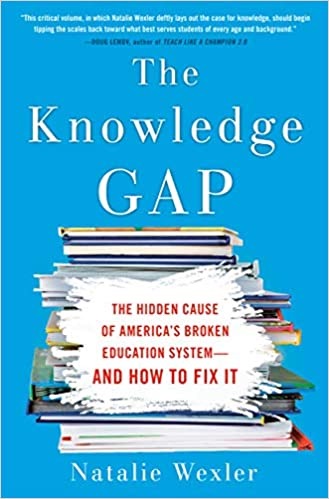
The Knowledge GAP: The Hidden Cause of America’s Broken Education System and How to Fix It by Natalie Wexler confronts the difference between content-rich and skills-based ELA curricula and makes a strong case for the former. She argues that students need a strong knowledge base in their long-term memories in order to comprehend complex text and to think critically. They also need systematic phonics instruction to learn how to decode words as they gain knowledge beyond their personal sphere. She sees a shift away from a focus on skills and leveled readers slowly taking place.
Part One – The Way We Teach Now: All You Need Is Skills – 1. The Water They’ve Been Swimming In
- The main point here is that all over the country, the focus in elementary schools is on teaching reading skills using texts that shun any meaningful history or science content. Math is also given a lot of attention as it is the other subject that shows up on federally mandated tests and test prep takes up a significant amount of time in most schools. Meanwhile, the achievement gap, which is really a test-gap, has not budged in twenty-five years. History and science are shunned in the early grades as they are widely considered to be not developmentally appropriate.
2. A Problem Hiding in Plain Sight
- An experiment from 1987 demonstrates the importance of prior knowledge when it comes to comprehension. It involved presenting students with texts that involved the play by play of a baseball game. It showed that bad readers who knew a lot about baseball outperformed good readers who didn’t. The idea is that real knowledge from social studies and science should be embedded in all reading lessons. This implies that the gaps we see on tests are more likely to be knowledge gaps than skills gaps.
- History is a series of stories and kids love stories. The same is true for science topics. It’s ironic that abstract concepts like captions and symbols are considered appropriate for six-year-olds while information from history, science, and the arts are not. Teaching disconnected comprehension skills boosts neither comprehension nor reading scores. They are analogous to empty calories.
3. Everything Was Surprising and Novel
- The focus here is on the work of Daniel Willingham. The two basic components of reading are decoding and comprehension. They are treated as one subject, but factors leading to success in each are fundamentally different. Instruction in phonics can teach decoding. As for comprehension, it depends on how much vocabulary and background knowledge the student has. It can be achieved naturally if you have enough information. Relying on teaching strategies to teach comprehension can explain the disastrous results we have seen. Teaching content is teaching reading. Reading tests are really knowledge tests in disguise as they draw on it to assess comprehension.
- Much of the problem can be laid at the feet of the schools of education. They spend little or no time on practicalities like classroom management. They seem to think that the more removed they are from ordinary concerns the more prestige they will garner. They aren’t big on exposing students to the findings of science. Most are also responsible for teaching that you should use strategies and skills for teaching comprehension and not using them much to teach decoding.
- Another reason some avoid testing content is that anything can be easily looked up on the Internet. What they miss is if you have to spend an inordinate amount of time looking things up, you will interrupt the flow of understanding that comprehension depends on. Retrieving information from long-term memory serves to reinforce it. You also might look up the wrong meaning of a word with multiple definitions.
4. The Reading Wars
- Here we get some history regarding Rudolph Flesch’s 1950’s studies and his conclusion that the systematic teaching of phonics was necessary to help students learn how to decode text. His book Why Johnny Can’t Read was a big sensation. This was the beginning of the Reading Wars. On the other side was the “whole language” movement. This turned somewhat political as teaching whole words was considered progressive and was largely adopted by the left who didn’t trust academics has they had never taught in an elementary classroom. Unfortunately, the Reading Wars aren’t over, they have only gone underground.
- What Flesch and his opponents missed was that unless you build knowledge and vocabulary, the ability to decode or recognize whole words wouldn’t count for much. Large adoptions of whole language programs largely failed. A phonics-based program called Reading First showed promise, but congress defunded it in 2008. It also treated reading as a self-contained subject, which leads to a decrease in subjects that could build knowledge and vocabulary. It’s also hard to change the beliefs of teachers when you don’t explain the underlying ideas.





